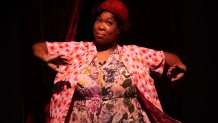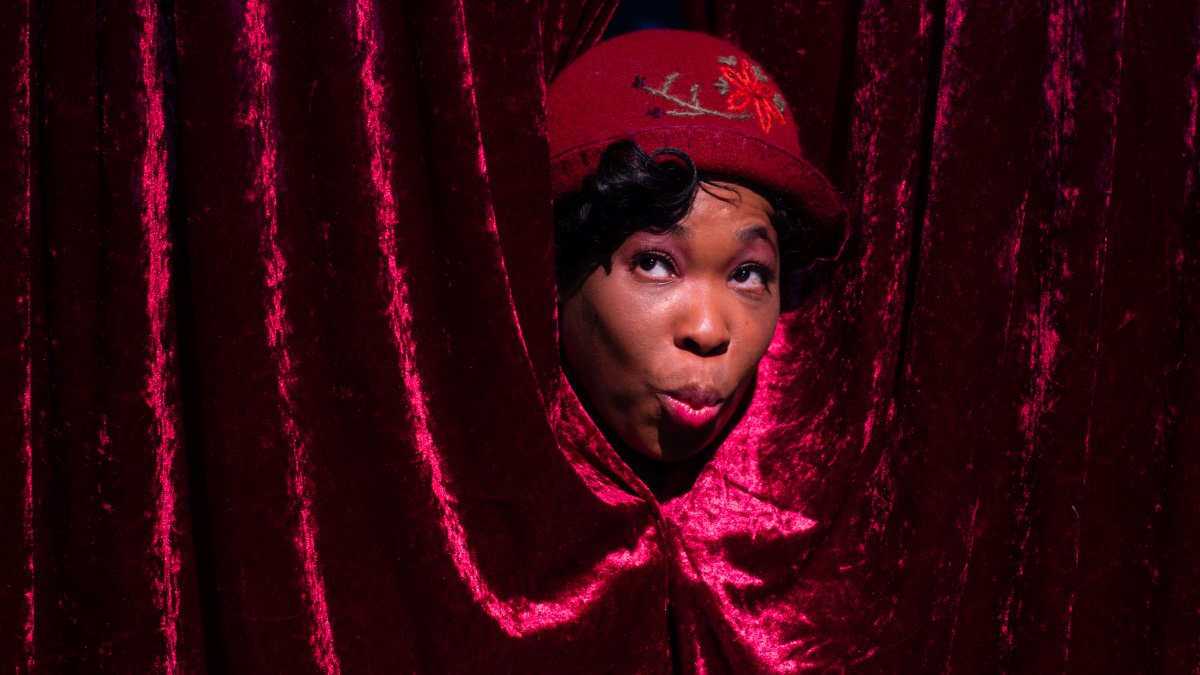Jackie “Moms” Mabley used laughter to start a revolution. Her life and career as a pioneering stand-up comedian are explored in I Got the Last Laugh, now playing at Jubilee Theatre in Fort Worth through Oct. 19.
Starting in the 1920s, Mabley, a Black openly queer performer, made people laugh about racism and sexuality. When she performed at the Apollo Theatre in 1939, Mabley became the first female comic to grace that legendary Harlem stage. After decades on Chitlin’ Circuit, Mabley recorded comedy albums, played Carnegie Hall and appeared on The Ed Sullivan Show and The Smothers Brothers Comedy House. A year before she died in 1975, she starred in her only film, Amazing Grace.
In James E. Carter’s play, a journalist interviews Mabley, played by Crystal Williams, at the Apollo Theatre. Through storytelling and performance flashbacks, the play traces Mabley’s story, from her humble beginnings in 1884 to her rise as America’s first female standup comic.
D. Wambui Richardson, Jubilee Theatre’s Artistic Director, directs the show.
“Theaters like Jubilee exist to make sure stories like Jackie “Moms” Mabley’s are not forgotten. Too often, the contributions of Black artists are overlooked or erased from the larger cultural conversation. By producing works like I Got the Last Laugh, we ensure that audiences not only celebrate these pioneers but also understand how their struggles and triumphs shaped the art and culture we enjoy today. Jubilee’s mission is to amplify the voices of African American artists, past and present, and this production is a perfect example of how we keep that legacy alive—by giving our community access to stories that inspire, challenge, and affirm who we are,” Richardson said.
Richardson talks about Mabley’s stage persona, what made her special, and her influence on other comedians.
NBC DFW: Why did you want to include this show in Jubilee Theatre’s season?
D. Wambui Richardson (DWR): At Jubilee, we are committed to telling stories that center the voices, artistry, and resilience of Black Americans. I Got the Last Laugh gives us the chance to shine a light on Jackie “Moms” Mabley—an icon whose name may not be as widely known today, but whose influence runs deep in the history of American comedy and culture. This production not only celebrates her brilliance but also introduces new generations to her legacy, reminding us of the shoulders so many artists stand on.
NBC DFW: Jackie “Moms” Mabley created a specific persona for her performances. How does this play reveal the woman behind the act?
DWR: Moms created a sharp, witty, grandmotherly character who could say things others couldn’t get away with. Behind that persona, though, was a woman of incredible courage who carried both pain and ambition. This play pulls back the curtain to show her humanity—the struggles, the disappointments, the loves, and the triumphs. It reminds us that her comedy wasn’t just an act; it was born from real life experience, resilience, and an unshakable will to be heard.

Kyra McGhee
Kyra McGhee
The play explores the life and career of the pioneering comic.
NBC DFW: What made Jackie “Moms” Mabley distinctive on the Chitlin’ Circuit?
DWR: Moms was fearless. On the Chitlin’ Circuit, she wasn’t just another performer—she was a truth-teller wrapped in humor. She spoke directly to her audiences about things they were living through: inequality, injustice, and even the taboos of sexuality. Her comedic timing, her honesty, and her ability to connect across generations made her stand out. She was one of the first women—and certainly one of the first openly queer women—to dominate that circuit, which made her presence revolutionary.
NBC DFW: How did she use comedy to talk about sexuality and racism in the 1920s – 1960s?
DWR: Moms had an incredible way of taking heavy, even dangerous subjects and making them approachable through humor. In a time when openly discussing race or sexuality could end careers, she used her comedic persona to deliver biting truths. She’d slip in commentary about racism or her attraction to women in ways that made audiences laugh first, then think. Her comedy disarmed people, giving her a platform to challenge prejudice while still entertaining.
NBC DFW: How has she inspired comedians today?
DWR: So many comedians—especially women and comedians of color—owe a debt to Moms Mabley. Her courage to tackle subjects that others avoided opened the door for artists like Richard Pryor, Whoopi Goldberg, Wanda Sykes, and countless others. Her legacy is in every joke that makes us laugh and think at the same time. Today’s comedians continue to draw on that tradition of truth-telling through humor, a tradition she helped pioneer.
Learn more: Jubilee Theatre
